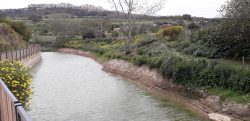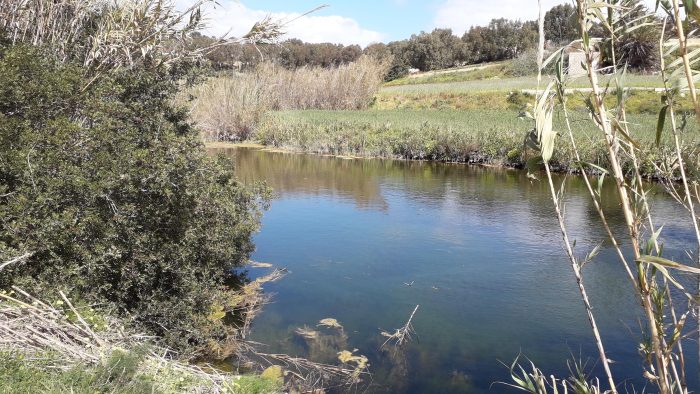As of today, the 15th of February 2023, using lead shot ammunition in wetlands is illegal in all 27 EU countries, as well as Iceland, Norway, and Lichtenstein. The law comes into force following a two-year period given to the EU countries to prepare for the change.[1]
With this law in place, the lives of an estimated one million waterbirds which currently die of lead poisoning in the EU, will be saved and the perpetuation of extreme poisoning of wetland wildlife will end. Exposure to lead can also have severe consequences for people should they be exposed to it, especially children.
One million waterbirds will be saved annually
Lead shot consists of tiny round bullets that hunters spray out of their rifles to kill animals. They use it to hunt waterbirds and other small animals, in wetlands and elsewhere.
It is estimated that hunters have been polluting our wetlands with more than 4,000-5,000 tonnes of lead shot annually, despite the existence of competitively priced alternatives.
Lead shot is particularly problematic for waterbirds that ingest lead pellets, mistaking them for grit: small particles of stone or sand. Birds swallow small bits of grit to act like teeth in their gizzard, a specialized stomach constructed of thick, muscular walls used for grinding up food. The grit helps break down hard foods, such as seeds.
The ban will also decrease the secondary poisoning of raptors and scavengers, which are regularly poisoned while eating prey contaminated with lead shot.
The BirdLife Partnership, of which BirdLife Malta forms part, has been working to have this poisonous ammunition banned for more than 20 years.
BirdLife Malta CEO Mark Sultana stated: “BirdLife Malta hopes that Malta can also rejoice and join the rest of Europe in this big win for nature that is a step in the right direction. Malta’s Government now needs to confirm what falls under a ‘wetland’. The Ramsar Convention on Wetlands‘ definition is clear and on these guidelines the valleys, water catchments and the entire coast of Malta should not allow any lead ammunition to be used when hunting. Since many hunters are nowadays creating man-made pools to attract birds for their hunting pleasure, even these areas would automatically mean they fall under wetland definition.
With all this, one would easily come to the conclusion that Malta and Gozo should not have any lead ammunition used in hunting practices. The responsibility is now in the hands of the Government and we hope that as was done with banning lead from fuel, paints and other material, the Maltese Government takes a stand for the common good of the citizens and nature and stops the use of lead once and for all.”
BirdLife Europe Senior EU Nature Policy Officer Barbara Herrero stated: “This is huge. Despite banning lead from paint, batteries, pencils, and virtually everything else several decades ago, it was still allowed to poison our shared environment – even when alternatives exist. With this ban, the EU has addressed a significant part of the problem. We now call on EU countries to make sure the ban is enforced.”
Unfortunately, the ban does not go beyond wetlands. Lead projectiles in hunting and outdoor sports shooting, as well as lead used in fishing sinkers and lures, will continue to poison the environment. But that can change soon. The European Chemicals Agency has assessed the health and environmental risks posed by these activities and tools and has concluded that an EU-wide restriction is justified.
The BirdLife Partnership will continue to stand up to the ammunition industry and hunting lobby to ensure Europe has the non-toxic environment it deserves.
Read the Maltese version of the press release here.
Notes for editors:
[1] All countries where the REACH Regulation applies will need to enforce a prohibition on the possession and use of lead shots in, or within 100m of, wetlands, as defined by the Ramsar Convention.
Ramsar defines wetlands as: “areas of marsh, fen, peatland or water, whether natural or artificial, permanent or temporary, with water that is static or flowing, fresh, brackish or salt, including areas of marine water the depth of which at low tide does not exceed six metres.” (Article 1.1 of the Convention)
BirdLife Europe and Central Asia is a partnership of 43 national conservation organisations and a leader in bird conservation. Our unique local to global approach enables us to deliver high impact and long-term conservation for the benefit of nature and people. BirdLife Europe and Central Asia is one of the six regional secretariats that compose BirdLife International. Based in Brussels, it supports the European and Central Asian Partnership and is present in 43 countries including all EU Member States. With more than 4,100 staff in Europe, two million members and tens of thousands of skilled volunteers, BirdLife Europe and Central Asia, together with its national partners, owns or manages more than 6,000 nature sites totalling 320,000 hectares.


